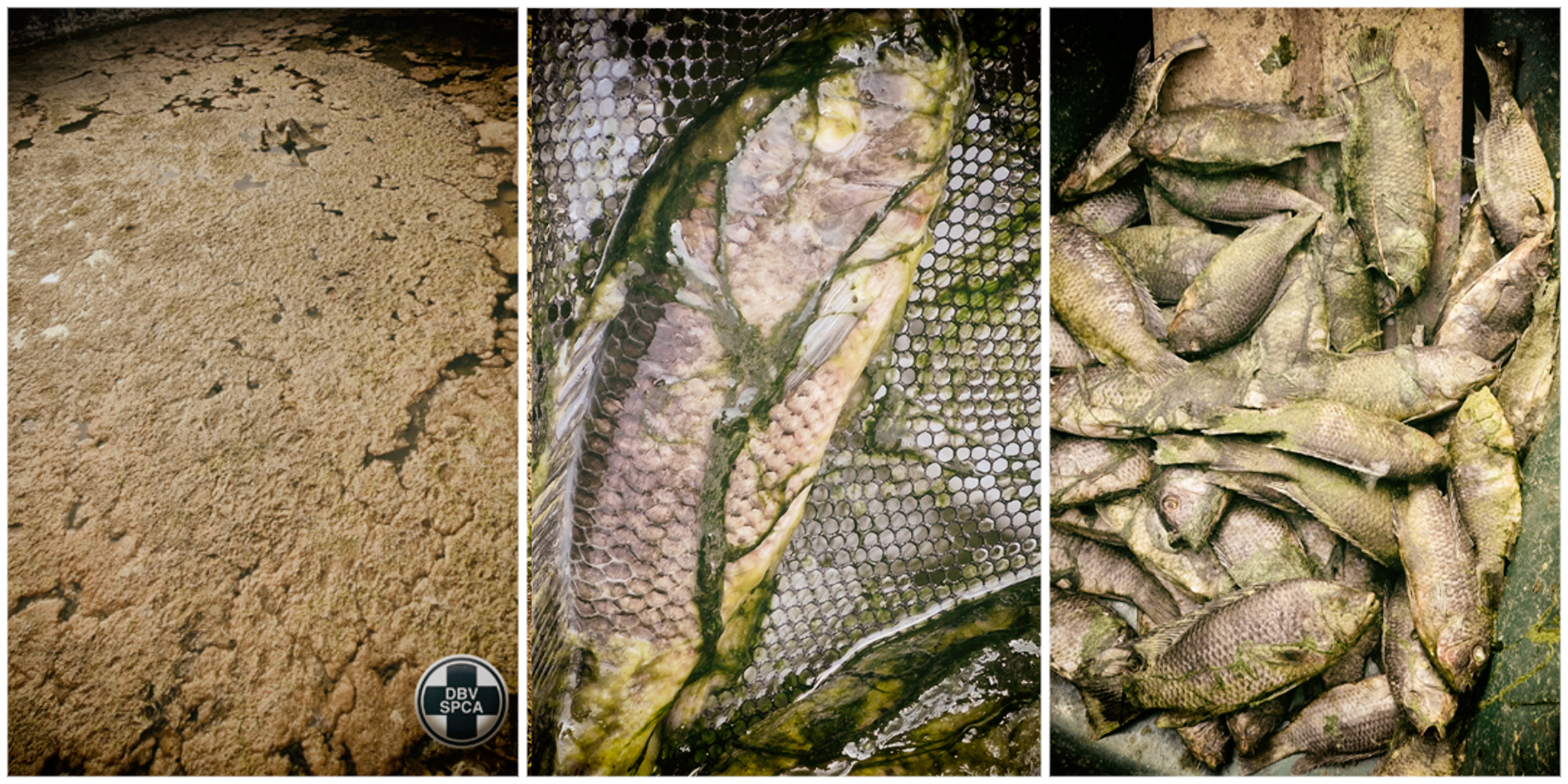“The ponds were full of dirty water with algae floating on it. There were dead fish in a wheelbarrow. We threw in some food but no fish appeared, then we used a net but it came up empty. So we got the caretaker to drain one of the ponds and there were dead fish at the bottom. It was a fish farm with nothing but dead fish. But the caretaker was continuing to feed them.”
NSPCA inspector Wrolien Rabi was visibly upset by what she found at Small Kloof Fisheries, a government-sponsored Mozambican tilapia fish farm in Volksrust. The owner (whose name is known to Daily Maverick) denied her entry, demanding that she obtain a search warrant, and then disappeared when she did.
 The NSPCA found dead fish in a wheelbarrow. (Photo: NSPCA)
The NSPCA found dead fish in a wheelbarrow. (Photo: NSPCA)
The roofing system protecting the fish tanks was missing. Though these are warm-water fish, it was winter and the water was freezing.
“It’s tough walking into a scene like that,” she tells me. “You see the outside and alarm bells start ringing. You think to yourself, ‘What am I walking into?’ Especially with a hesitant owner who insists on his rights.
“At the end of the day, we’re there for the animals. My partner and I walked through and saw the dead fish lying there; the shocking condition of the ponds. You wonder if there’s any chance that fish are surviving in those conditions. And you find they’re all dead.”
 Fish tank covered in algae indicates absent filtration. (Photo: NSPCA)
Fish tank covered in algae indicates absent filtration. (Photo: NSPCA)
 A net cast into the tanks found no live fish. (Photo: NSPCA)
A net cast into the tanks found no live fish. (Photo: NSPCA)
According to an NSPCA report, the farm had been given to the owner by the Mpumalanga Department of Agriculture, Rural Development and Land Reform, which it says knew of the facility’s deteriorating conditions. This raises questions about oversight and accountability.
“We were able to confirm that the department provided the land,” says Rabi.
“They were supplying fingerlings and apparently were planning to offer more funding to fix up the structure. But the owner doesn’t seem to communicate with the department. It was one of those Estina-type projects. That’s what we could gather. We’ve written to the department and are awaiting their response in terms of the role they play on this farm.”
Lack of support
Nazareth Appalsamy, who heads the NSPCA’s Farm Animal Protection Unit, said the state of the farm was the latest in a worrying trend.
“This isn’t the first time something like this has happened. The problem with government-funded projects is that the government provides the infrastructure and resources, including the animals – in this case, fish. But the owner is then expected to maintain what has been given to them as part of the government initiative.
“More often than not, these projects fail due to poor mentorship and lack of skills among the recipients. We’ve seen it with chickens, beef and other livestock. It’s amazing how the government awards these projects without ensuring the recipients have the necessary skills, market access or ability to maintain them.
“The aquaculture farm was a brand-new facility built for this individual, but due to mismanagement and negligence, this is the current state. The department gave a very expensive project to someone who knows nothing about fish farming.”
It wasn’t possible to ascertain how much it cost to set up the Volksrust aquaculture operation, but a similar project in North West province cost the government R1.6-million to build.
According to a local website on fish farming, success comes down to good water management. This means regularly monitoring the water quality, and paying attention to factors like temperature, pH, dissolved oxygen and ammonia levels. A good filtration and temperature control system is essential. According to Rabi, none of this was taking place.
‘Beneficiary’s responsibility’
The farm owner ignored our calls. In reply to a request for clarity, the Mpumalanga Department of Agriculture, Rural Development and Land Reform essentially washed their hands of the issue.
The department’s Zanele Shabangu said they were investigating the NSPCA’s findings, but added: “The management and maintenance of the facility lies entirely with the beneficiary following the handover.”
She added that the department “continued to provide technical support and address technical issues” and noted rather unhelpfully – given that all the fish are dead – that “if the water quality within the system is maintained at optimal levels, fish mortalities can be entirely avoided”.
According to Nazareth Appalsamy, the NSPCA has had to close down many such projects.
“There was one two years ago in Limpopo… another government project with state-of-the-art facilities. A year later, the place was in shambles – the beneficiaries were fighting and there was no feed for the animals. We had to intervene, prosecute, and seize animals. There are so many cases like this.”
What next for the fish farm?
“It’s clear that the department would be shooting themselves in the foot if they gave this individual more fish or tried to resurrect the project,” says Appalsamy.
“The facilities are not up to standard and the owner clearly lacks the knowledge needed for fish farming. The fact that they were still feeding ponds with no living fish is an indication of their inability to manage the farm.
“There wasn’t a single fish alive and they were still feeding them. The department gave a very expensive project to someone who knows almost nothing about fish farming.” DM




 A net cast into the tanks found no live fish. (Photo: NSPCA)
A net cast into the tanks found no live fish. (Photo: NSPCA) 